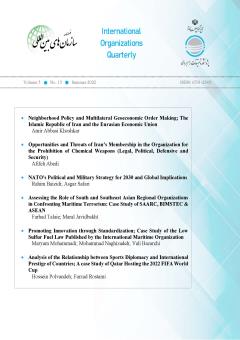-
-
-
Open Access Article
1 - Role of the Islamic Republic of Iran in Regional and International Institutions
Nasrin Mosaffa جواد امینمنصورWith the emergence of transnational and multilateral arrangements as major means of international negotiations and cooperation, questions have arisen about membership and participation in such arrangements: how to interact with them, and how to assess the impact of tran MoreWith the emergence of transnational and multilateral arrangements as major means of international negotiations and cooperation, questions have arisen about membership and participation in such arrangements: how to interact with them, and how to assess the impact of transnational institutions on national interests of member states. The present paper reviews the theoretical frameworks related to this issue before analyzing the role of the Islamic Republic of Iran in regional and international institutions and discussing the necessity of establishing a desirable and effective relations with international organizations. In doing this, the experience and scope of the presence and activities of the Islamic Republic of Iran in these organizations have been divided into three periods: from the victory of the Islamic Revolution to the end of the Iraq’s war against Iran in 1988; from 1989 to 2004, and from 2004 up to the present time. The paper enumerates common features of these three periods as well as their differences to delineate an overall picture of the Islamic Republic of Iran’s foreign policy with relation to regional and international institutions. Manuscript profile -
Open Access Article
2 - Victims of Peace: UN Responsibility and Remedial Mechanisms
ghasem zamaniOccasional violations of international law occur as the United Nations and its peacekeeping forces carry out their important responsibility and mission for protecting global peace and security. Remedial mechanisms become more complicated when the actions of peacekeeping MoreOccasional violations of international law occur as the United Nations and its peacekeeping forces carry out their important responsibility and mission for protecting global peace and security. Remedial mechanisms become more complicated when the actions of peacekeeping forces are attributed to the UN as a result of certain principles of international responsibility. On the one hand, the UN’s responsibility toward victims of such violations requires the world body to be answerable while, on the other hand, its immunity to trial in national and transnational courts, has barred victims from taking legal action. Although the UN has taken steps to solve this problem in order to restore the credit it has lost as a result of the actions of its forces as well as its immunity, the proposed mechanisms have posed new challenges, thus, making the UN target of new criticism. Such criticism seems even more justified as a result of the promotion of human rights in international community and alterations in the aforesaid immunity. The present paper discusses the necessity of introducing new mechanisms or reforms by the UN which would make the existing mechanisms more efficient and fairer Manuscript profile
List of Articles the United Nations
-
The rights to this website are owned by the Raimag Press Management System.
Copyright © 2017-2024


